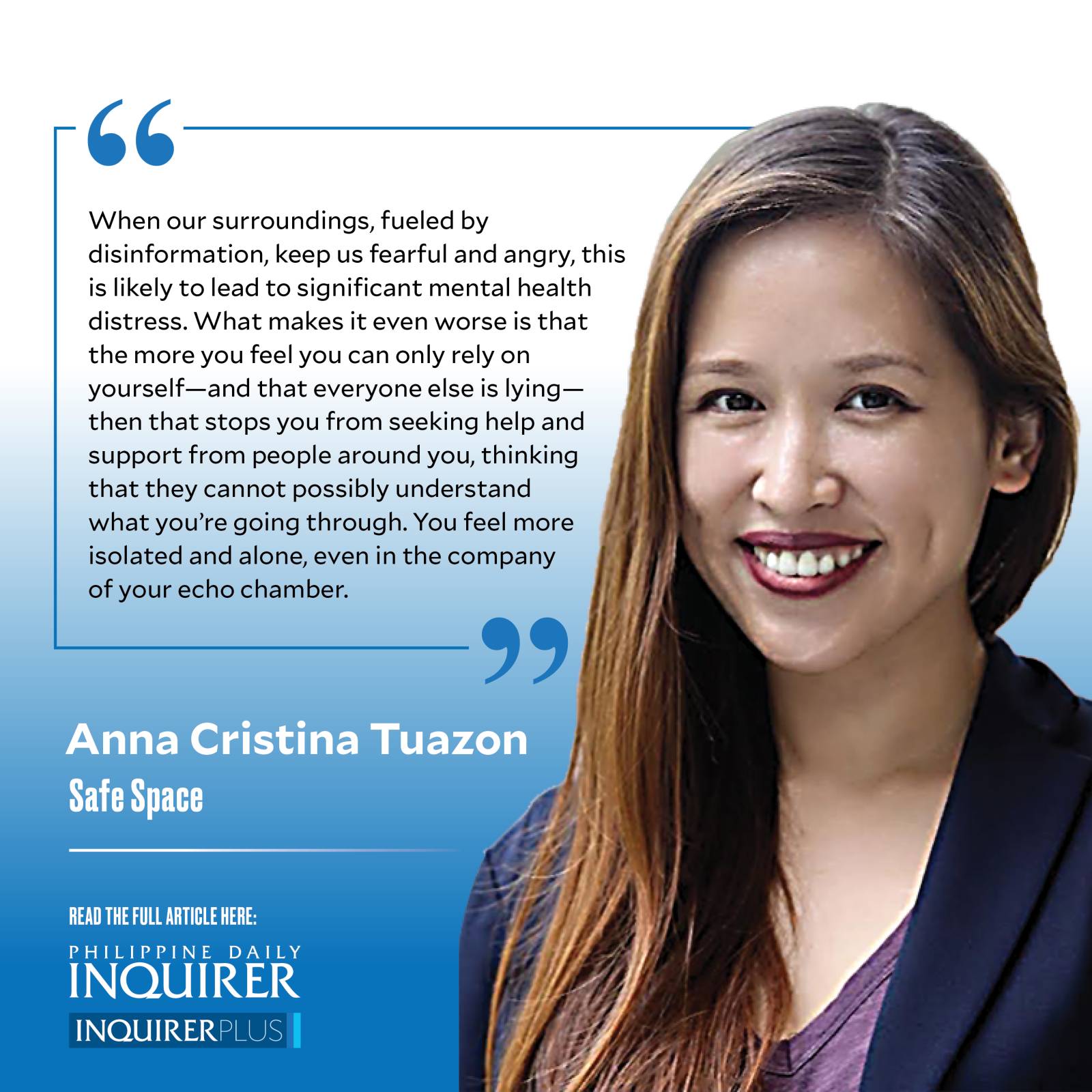Yesterday’s headline referred to the huge problem that is fake news. Nine out of 10 Filipinos believe fake news is a problem, according to a Pulse Asia Research survey, with more than half believing that bloggers and vloggers are responsible for disinformation. Even the findings of this survey need to be met with caution, as the belief that certain information is fake news can itself be inaccurate. Therein lies the crux of the matter: We don’t know who or what to believe anymore. This doesn’t just affect social or political spheres, but affects mental health as well.
One way to know if we are mentally healthy is if we can discern reality. The ability to check our emotional experience with our surroundings is necessary for emotion regulation. When we know what is happening around us, we can respond and adapt accordingly. However, what happens when we cannot be certain about our external reality? When we are bombarded with so much disinformation that it casts serious doubt as to whether we can believe what other people are saying, then we realize it is useless to engage in reality-testing, making us trust solely in our emotional experience. Not being able to rely on others for truth means you can only rely on yourself—your experience, your perspective, your views, opinions, and beliefs.
Ironically, when your own experience and perspective becomes the only barometer for truth, you are actually much more likely to believe in disinformation that confirms or corroborates your perspective. This leads to polarization of views and beliefs, and you begin to adopt a black-and-white view of the self, others, and the world. You perceive less community around you and instead perceive more adversaries.
Disinformation is not an equal-opportunity beast. It tends to favor mistruths that make you angry or fearful. Social media companies know this very well, hence why they develop algorithms to push rage-inducing posts on our newsfeeds to keep you engaged longer. Anger doesn’t like to be experienced alone; it wants validation from others. There is odd comfort in knowing that (1) you were right to be angry, and that (2) you are not the only one who is mad about this. Disinformation encourages rage, anger, upset, frustration, and disappointment. Disinformation creates more mistrust, which urges us to withdraw into our own echo chamber, making us even more vulnerable to further disinformation.
Disinformation does not happen by accident or randomly. It is the tool of tyrants. When it stokes much fear and anger, tyrants step in and point fingers at an imagined enemy, saying this is the cause of your misery. When fear and anger are targeted toward a common enemy, then people are willing to give up their freedoms and autonomy to help the tyrant “vanquish” this evil. But why would the tyrant do so? Fear and anger keeps them in power. And so the illusion of an enemy is perpetuated through further disinformation.
When our surroundings, fueled by disinformation, keep us fearful and angry, this is likely to lead to significant mental health distress. What makes it even worse is that the more you feel you can only rely on yourself—and that everyone else is lying—then that stops you from seeking help and support from people around you, thinking that they cannot possibly understand what you’re going through. You feel more isolated and alone, even in the company of your echo chamber.
Not being able to ask for help allows distress to continue and, eventually, turn into hopelessness and helplessness, red flags for suicide risk. Cognitive theories of depression explain it as a persistent and globalized negative view of the self, others, and the world: “I am unlovable; others don’t care about me; the world is uncaring.” When framed this way, we can see how a culture of disinformation promotes a depressive perspective.
How do we counter the insidious mental health effects of disinformation? We need to get curious about perspectives different from our own. We need to start to fact-check our own beliefs and opinions. Anger and fear can only be countered with love and support. Don’t cut off loved ones who have succumbed to fake news—reach out to them instead with nonjudgment, and help them resolve their fears. Get to know people until you see their multiple dimensions—no one is simply good or evil. If we can’t trust what’s out there, form your own circle of trust and include people that provide differing perspectives so that, collectively, you begin to see the whole picture. Start with people you know, and grow outward from there until you have a community you can rely on. We need to embrace complexity in our realities so that we don’t fall prey to the simplistic lure of disinformation.
——————
aatuazon@up.edu.ph


